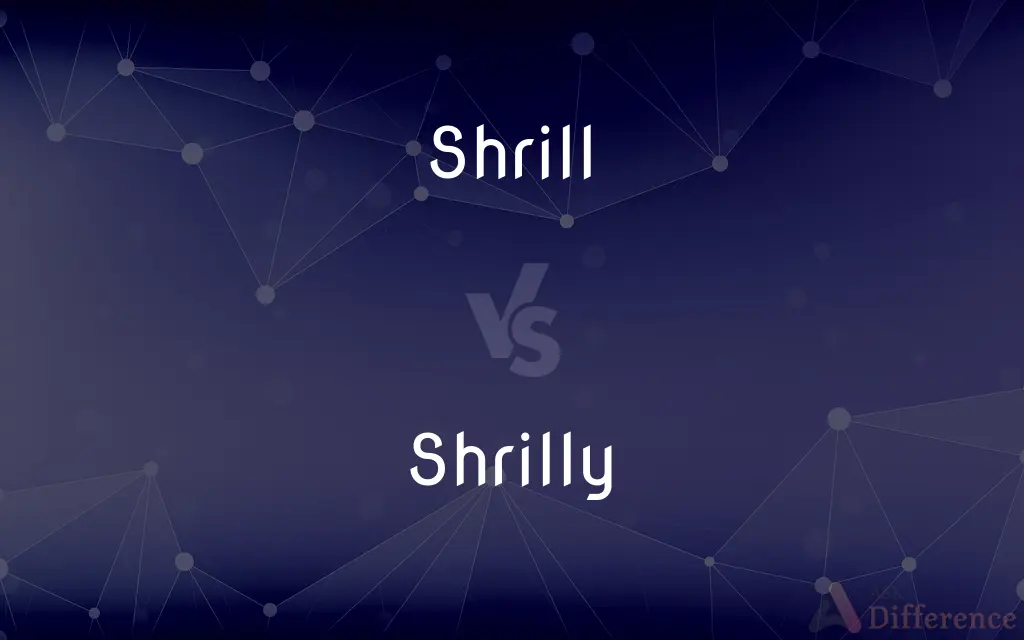Shrill vs. Shrilly — What's the Difference?
By Urooj Arif & Fiza Rafique — Updated on April 6, 2024
Shrill describes a high-pitched, piercing sound, while shrilly is an adverb modifying how something is done with a shrill quality.

Difference Between Shrill and Shrilly
Table of Contents
ADVERTISEMENT
Key Differences
Shrill is an adjective used to describe sounds that are high-pitched and piercing to the ears, such as the shriek of an alarm or the cry of certain birds. These sounds are often perceived as harsh or uncomfortably loud. Shrilly, on the other hand, is the adverbial form of shrill, used to describe the manner in which a sound is made or an action is performed. For example, when someone speaks shrilly, their voice takes on a high-pitched and piercing quality, often conveying urgency or intensity.
While shrill directly modifies nouns and denotes a clear, specific quality of sound, shrilly modifies verbs, indicating the manner in which the sound is produced or an action is carried out. This distinction helps in precisely communicating the nature and quality of sounds or actions.
The use of shrill is common in describing unpleasant or attention-grabbing sounds, suggesting a level of discomfort or alertness provoked by the noise. Shrilly, being an adverb, offers a descriptive layer to actions, particularly in storytelling or descriptive writing, to evoke a vivid auditory imagery.
Shrill often associated with alarms, cries, or any sound that can cut through ambient noise. Shrilly especially useful in dynamic contexts, where the sound's quality significantly influences the scene or narrative.
Comparison Chart
Part of Speech
Adjective
Adverb
ADVERTISEMENT
Definition
Describes high-pitched, piercing sounds
Describes the manner of producing a shrill sound
Usage
Modifies nouns
Modifies verbs and adjectives
Examples
Shrill alarm, shrill voice
Speaks shrilly, laughed shrilly
Connotation
Often negative, indicating discomfort
Adds detail to actions, emphasizing their sound quality
Compare with Definitions
Shrill
Describes a high-pitched, piercing sound.
The shrill alarm woke everyone in the house.
Shrilly
Used to modify verbs related to sound production.
The phone rang shrilly in the quiet room.
Shrill
Can describe voices or sounds that demand attention.
Her shrill cry cut through the noise of the crowd.
Shrilly
Implies a penetrating or harsh sound quality.
He laughed shrilly, drawing glances from around the room.
Shrill
Often associated with urgency or alarm.
The shrill beep of the timer indicated the food was done.
Shrilly
Often indicates a heightened emotional state when used.
The crowd cheered shrilly as the team scored.
Shrill
Frequently found in descriptions of acoustic phenomena.
The whistle's shrill sound could be heard blocks away.
Shrilly
Adverb describing how something is done shrilly.
She spoke shrilly in her excitement.
Shrill
Used to characterize unpleasant or grating noises.
The bird's call was unexpectedly shrill.
Shrilly
Enhances descriptions of voices or actions in narrative.
She called out shrilly, trying to catch their attention.
Shrill
(of a voice or sound) high-pitched and piercing
A shrill laugh
Shrilly
High-pitched and piercing in tone or sound
The shrill wail of a siren.
Shrill
Make a shrill noise
A piercing whistle shrilled through the night air
Shrilly
Producing a sharp, high-pitched tone or sound
A shrill fife.
Shrill
A shrill sound or cry
The shrill of a smoke detector filled the air
Shrilly
Sharp or keen to the senses; harshly vivid
Shrill colors.
Shrill
High-pitched and piercing in tone or sound
The shrill wail of a siren.
Shrilly
To utter in a shrill manner; scream.
Shrill
Producing a sharp, high-pitched tone or sound
A shrill fife.
Shrilly
To produce a shrill cry or sound.
Shrill
Sharp or keen to the senses; harshly vivid
Shrill colors.
Shrilly
In a shrill manner.
Shrill
To utter in a shrill manner; scream.
Shrilly
Somewhat shrill.
Shrill
To produce a shrill cry or sound.
Shrilly
In a shrill manner; acutely; with a sharp sound or voice.
Shrill
High-pitched and piercing.
The woods rang with shrill cries of the birds.
Shrilly
Somewhat shrill.
Some kept up a shrilly mellow sound.
Shrill
Having a shrill voice.
Shrilly
In a shrill voice;
She sang rather shrilly
Shrill
Sharp or keen to the senses.
Shrill
Fierce, loud, strident.
Shrill
To make a shrill noise.
Shrill
A shrill sound.
Shrill
Acute; sharp; piercing; having or emitting a sharp, piercing tone or sound; - said of a sound, or of that which produces a sound.
Hear the shrill whistle which doth order giveTo sounds confused.
Let winds be shrill, let waves roll high.
Shrill
A shrill sound.
Shrill
To utter an acute, piercing sound; to sound with a sharp, shrill tone; to become shrill.
Break we our pipes, that shrilledloud as lark.
No sounds were heard but of the shrilling cock.
His voice shrilled with passion.
Shrill
To utter or express in a shrill tone; to cause to make a shrill sound.
How poor Andromache shrills her dolors forth.
Shrill
Utter a shrill cry
Shrill
High-pitched and sharp;
Piercing screams
A shrill whistle
Common Curiosities
Is shrill always negative?
While shrill often has a negative connotation, it can also simply denote a very high-pitched sound, like an alarm, meant to alert or attract attention.
What's the difference between speaking shrilly and speaking sharply?
Speaking shrilly emphasizes the high pitch and piercing nature of the voice, while speaking sharply focuses on the brisk, direct manner of speaking, often conveying irritation or authority.
Can a voice be described as shrilly?
Yes, a voice can be described as speaking or laughing shrilly, emphasizing the high-pitched and piercing quality of the sound.
How is shrilly used in a sentence?
Shrilly is used as an adverb to describe the manner in which an action, often related to sound, is performed, indicating a shrill quality.
How do shrill sounds affect people?
Shrill sounds can be startling, cause discomfort, or demand attention, affecting people's emotions and reactions.
Can environmental sounds be shrill?
Yes, environmental sounds like alarms, sirens, or certain animal calls can be described as shrill.
What is the difference between shrill and loudly?
Shrill refers specifically to the high-pitched and piercing quality of a sound, while loudly describes the volume level of a sound.
Can an alarm sound shrilly?
Yes, an alarm can sound shrilly, indicating a high-pitched and urgent quality meant to alert or warn.
What does shrill mean?
Shrill describes sounds that are high-pitched and piercing, often in an unpleasant or attention-grabbing way.
Is the use of shrilly common in writing?
Shrilly is less common than shrill but is used in writing to add descriptive detail to how sounds are made or actions are performed.
Can animals make shrill sounds?
Yes, many animals, especially birds, can make shrill sounds either as a call to attract mates or as an alarm.
Can music be described as shrill?
Yes, music or instruments can be described as shrill if they produce high-pitched and potentially unpleasant sounds.
Does shrilly have a positive or negative connotation?
Shrilly often carries a negative connotation due to its association with high-pitched, piercing sounds, but context can influence its interpretation.
Can laughter be described as shrill?
Yes, laughter can be described as shrill when it's high-pitched and piercing, often indicating nervousness or excitement.
Is it common for people to speak shrilly during arguments?
It's not uncommon for voices to become shriller during arguments, as emotions heighten and people attempt to be heard over each other.
Share Your Discovery

Previous Comparison
Diaspora vs. Migration
Next Comparison
Anime vs. CartoonAuthor Spotlight
Written by
Urooj ArifUrooj is a skilled content writer at Ask Difference, known for her exceptional ability to simplify complex topics into engaging and informative content. With a passion for research and a flair for clear, concise writing, she consistently delivers articles that resonate with our diverse audience.
Co-written by
Fiza RafiqueFiza Rafique is a skilled content writer at AskDifference.com, where she meticulously refines and enhances written pieces. Drawing from her vast editorial expertise, Fiza ensures clarity, accuracy, and precision in every article. Passionate about language, she continually seeks to elevate the quality of content for readers worldwide.
















































